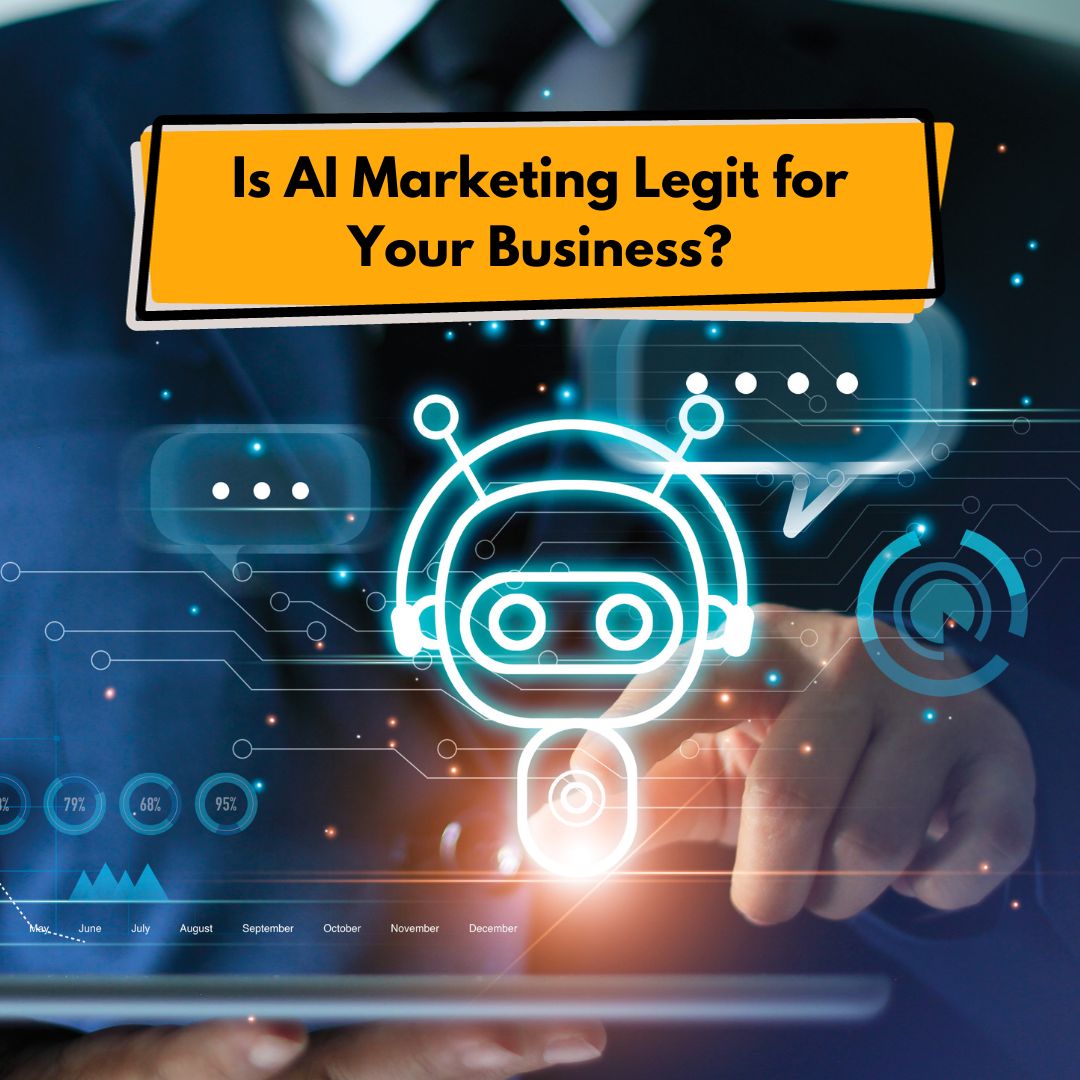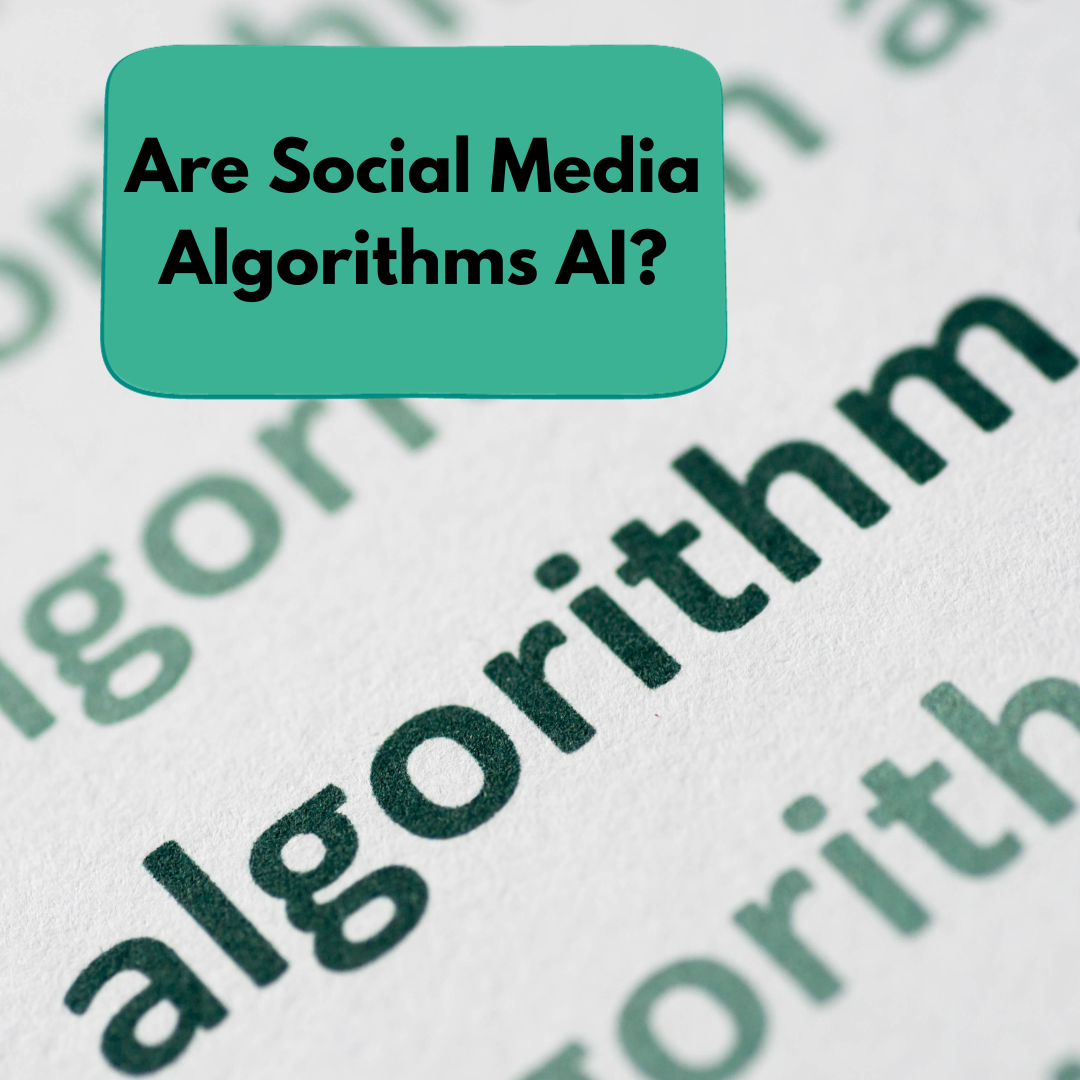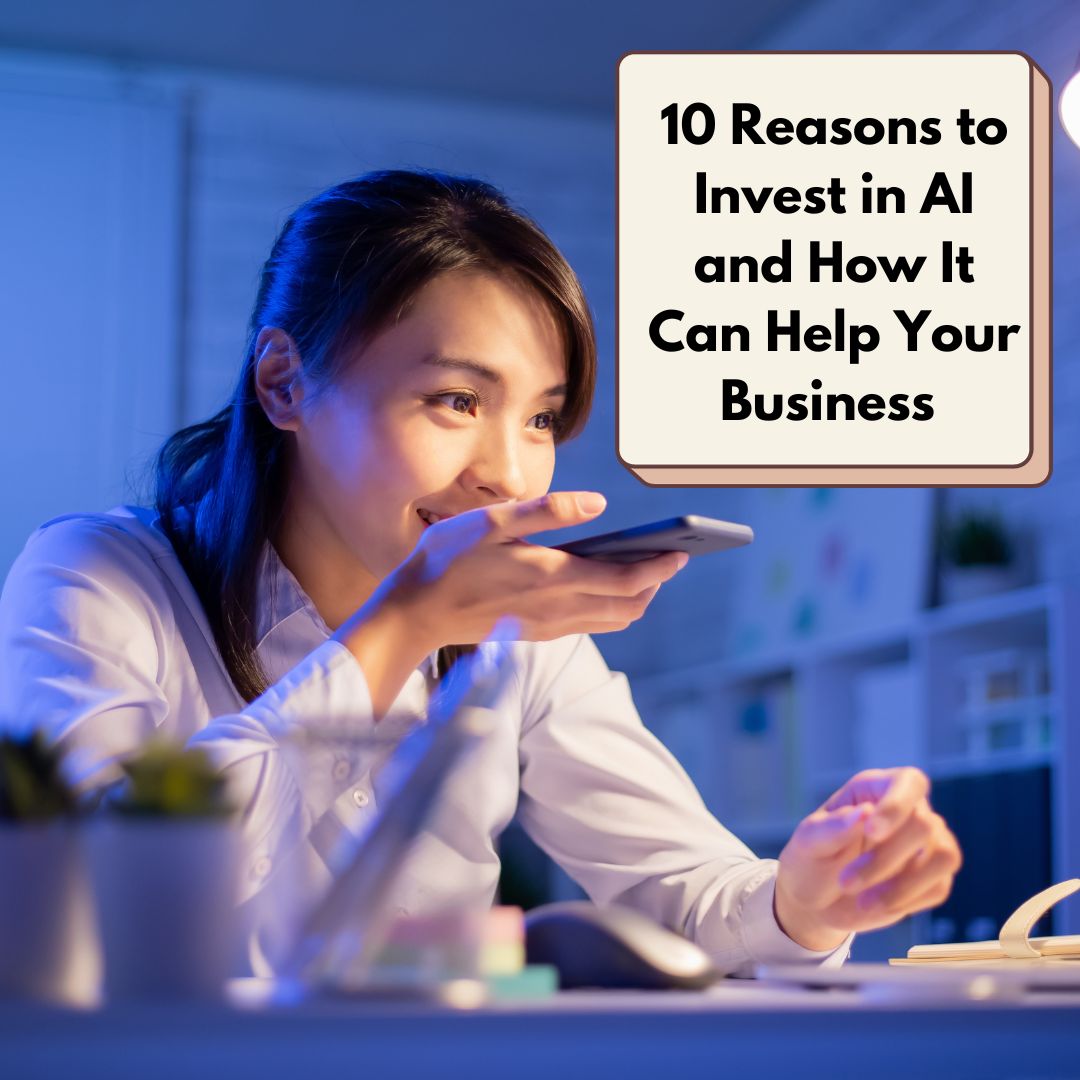In an era where Artificial Intelligence (AI) is seamlessly integrated into various facets of digital…

Is AI Marketing Legit for Your Business?
In 2023, more and more people are talking about artificial intelligence (AI) and marketing, leaving many wondering about the practical implications for businesses, especially small businesses in Singapore. This blog aims to debunk AI marketing, exploring its definition, real-world applications, benefits, drawbacks, and strategies.
What is AI marketing?
AI marketing is having a super-smart assistant for your business. It uses advanced technology to understand how your customers behave and helps you figure out what they might do next. This way, you can enhance your customers’ experience and help them find what they need. AI in marketing can take various forms, including chatbots, targeted advertising, and content generation.
To employ AI in marketing, businesses typically allow it to gather and analyse data, learning from customer behaviour to assist in achieving business objectives. AI can even initiate interactions with customers based on specific actions they take on your website, like clicking a button or engaging with social media posts.
How do marketers use AI?
AI has seen a steady rise in popularity over the past decade, with a 27% reported increase in its implementation in marketing strategies. The top applications include content personalisation, predictive analytics for customer insights, and targeting decisions. Let’s explore some scenarios where AI proves invaluable in marketing.
Content Personalisation
Imagine your favourite shopkeeper who remembers your preferences. AI does something similar but on a larger scale. It analyses what your customers like and helps you give them exactly what they want. This makes your customers feel special and keeps them coming back for more. Tools like 6Sense leverage AI to sift through intent data, aiding in understanding which audience members are actively seeking to make a purchase, and enabling a customised marketing experience.
Data Analytics
One of AI’s primary functions in marketing is data analytics. AI efficiently gathers and sifts through vast datasets from multiple marketing campaigns, summarising key findings. By utilising historical data, including metrics like consumer engagement, purchases, time spent on pages, email opens, and more, AI predicts the outcome of marketing campaigns. This significantly streamlines the process of strategising and crafting marketing assets for campaigns.
Content Generation
AI proves immensely useful in content creation. It can assist in generating captions, social media posts, email subject lines, and even blog content. While we’ve witnessed AI’s ability to write articles on specific topics, it’s crucial to note that most AI-generated content may not be ready for immediate publishing. Today, most marketers use generative AI to recommend content and generate portions of articles. This content is subsequently fact-checked, edited, and refined to infuse a more human touch.
Media Buying
Another facet of AI in marketing involves media buying. AI technology can predict the most effective ad placements and media channels to reach a target audience, maximising return on investment (ROI). To implement this strategy, businesses employ AI software specifically tailored for media buying teams. For instance, offering recommendations on ad spend, and facilitating precision in targeting the right audience to enhance performance.
Chatbots
Chatbots, driven by natural language processing (NLP), are a longstanding application of AI in marketing. These bots swiftly address customer queries, assist in lead nurturing, address frequently asked questions and more. A chatbot can personalise the customer journey, particularly during the phase of consuming marketing content. This tool also serves to address customer questions effectively.
Automated Email Marketing Campaigns
Automated email marketing has been a staple for years, but AI tools amplify the impact by generating more engaging email content and learning from email list behaviours. The goal is to reduce the time spent on research and brainstorming, allowing marketers to focus on delivering successful campaigns. As AI continues to advance, automated email marketing software assumes even greater significance in the marketing toolkit.
Sales Forecasting
AI proves invaluable in forecasting sales. While this may seem more aligned with sales than marketing, AI aids marketers in understanding the predicted outcomes of their campaigns and marketing assets. This insight empowers marketers to develop more effective campaigns that yield tangible sales and ROI.
Enhancing Customer Experience
At its core, marketing is about crafting exceptional customer experiences, and AI plays a pivotal role in this arena. AI aids in boosting customer retention and loyalty, delighting customers through personalised content, and refining marketing assets for optimal impact.
SEO
One of AI’s most substantial contributions to marketing lies in its ability to optimise content for search engines. AI algorithms analyse website traffic, pinpoint keywords that enhance search engine rankings, and monitor competitors’ activities. Additionally, AI-powered tools provide marketers with insights into their audience’s preferences, enabling them to customise content to align with those interests.
In the next section, we’ll delve into real-life examples of how industry leaders have effectively employed AI in their marketing efforts. This practical insight will help shed light on how AI can be a game-changer for businesses across various sectors.
Examples of AI Marketing
At this point, you might be wondering, “Okay, but how does this look in practice?” Let’s review some real-life examples of how big media companies have used AI in their marketing.
1. Netflix
If you’re in marketing, you know you have to deliver the right message to the right person at the right time. Netflix uses AI to do this. How? On a Netflix Tech Blog, the company explains how it uses previous viewing history to determine the artwork for recommended movies or TV shows. For example, if you’ve watched a lot of one actor’s movies, they might recommend another movie they’re in. But if the artwork doesn’t show off the actor, you may click away. So, when the movie is recommended to this specific viewer, the artwork will showcase that actor. Or maybe a viewer tends to watch more comedies than romances. When Netflix recommends a movie, they might change the artwork to show off comedic scenes versus romantic moments from the film.
So, why does Netflix do this? The goal is to increase conversion rates and improve the customer experience on their platform.
2. Spotify
Spotify uses a similar approach to Netflix. The company will use AI to understand a user’s music interests, podcast favourites, purchase history, location, brand interactions, and more. Then, customized playlists and recommendations are curated for each user.
This type of content personalisation has helped major media companies like Spotify become top streaming platforms. But the personalisation doesn’t end there. Spotify will also send automated email marketing messages with personalised recommendations. The goal? Create automated marketing messages and assets that will convert a user because the message is specific to that customer.
3. Amazon
Two major use cases for AI in marketing are forecasting sales and analyzing data. Amazon uses AI to do just that. When you go on Amazon, there is a recommended products section that uses predictive analytics to determine if a customer is likely to make a purchase.
This helps the marketing teams at Amazon know what products to place in front of which customers. Plus, they can predict how well a product will sell based on their recommended product campaigns. This type of AI helps increase conversions, improve customer satisfaction, and measure the overall success and ROI of various marketing campaigns.
AI Marketing Pros and Cons
We’ve covered a lot so far, including what AI marketing looks like in the real world. However, is this something you should implement at your company? Below, we’ll discuss some of the advantages and disadvantages of AI marketing.
AI Marketing Advantages
1. Increase your ROI. As you can see from the examples above, the main goal of using AI in marketing is to increase ROI and build campaigns that are easier to track. The data analytics and insight AI provides can be leveraged to produce better marketing assets and improve your campaigns in real-time. This will save your marketing team time and money, allowing them to work more efficiently and increase profits.
2. Improve customer relationships. Another advantage is that using AI in marketing can help improve your relationship with your customers. The more personalized your recommendations are and the deeper your relationship with your customer is, the more likely they’ll become repeat purchasers. This happens through AI’s ability to personalize marketing assets and content in real-time. Additionally, AI can identify customers at risk of churning and put them in an automated marketing campaign to get them to re-engage with your company.
3. Make better, strategic marketing decisions. AI is becoming more popular in marketing, culminating in the ability to make better strategic marketing decisions. As your company and marketing team grow, scaling has never been more important (but also, it’s never been more difficult). AI can make scaling your business easier, using data to analyze, predict, and create marketing assets that sell. See how your team can use artificial intelligence and automation in this course from HubSpot Academy.
AI Marketing Disadvantages
1. Content quality. If you’re going to use AI to generate content without having a human edit it, you’re going to see a drop in the quality of your content. The success of AI is reliant on high-quality data that is accurate and timely. Without a human editor, AI can produce content with factual inaccuracies, bias, or a divergent tone from your brand. Using AI requires human oversight so these types of mistakes don’t happen.
2. Privacy. As marketing assets have become more personalized through the years, customers are beginning to value privacy more and more. With AI, some of these techniques require using a customer’s cookies and previous internet behaviour to predict future purchases. If your marketing team downloads and uses AI software, you’ll need to be sure you comply with privacy laws, such as GDPR in Europe.
3. Evaluating non-quantifiable KPIs. It might be hard to get buy-in to invest in AI at your company because there are non-quantifiable KPIs at play. Certain metrics will be easy to track, but others — like improving the customer experience, increasing brand awareness, or improving reputation — will be much harder. That’s why it’s important to have the right measurement tools in place.
Marketing Strategies That Use AI
Many marketing strategies take advantage of AI. Consider whether your team could benefit from some (or all) of these tactics. These strategies include:
Content marketing: Whether it’s for content generation or personalization, AI can help your team produce more content in less time. Personalization software may be just the thing your brand needs.
Product marketing: By tracking user behaviour, AI can make recommendations for customers and predict purchases. AI can keep your brand top of mind while you engage in other tasks that AI can’t perform.
Email marketing: AI can help you produce lead-nurturing marketing emails and analyze past email behaviours and performance. It can send automatic emails based on customer behaviour and flag outstanding emails and those needing work.
Advertising: AI can take care of buying media ads, whether it’s display ads, PPC, or paid social, so the content you’ve crafted can make it to your target audience.
Remember: AI should help your team level up their operations. Human input and editing will always be part of the process. Critical thinking skills should be positioned alongside AI content. to empower your team to engage AI effectively and accurately. Learn best practices for critical thinking and problem-solving in the workplace.
By utilising the power of AI marketing, teams can scale their operations with AI, and it doesn’t have to break the bank. However, it’s important to keep in mind the limitations of AI, even as the technology continues to get better over time in the changing marketing landscape. While you might be able to use it to aid several marketing campaigns (and should), it isn’t replacing marketers just yet.



